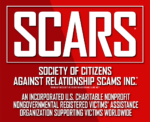SCARS COMMENTARY: The Truth About SCARS & What Haters Say
It is a new year and it is time for some hard truths and reflection as the year begins.
One of the things we are told over and over is how certain anti-scam hate groups, well … HATE US
Over the years we wondered why that was. We are fighting the good fight. We are helping thousands through our victims’ assistance efforts. We educate and transfer knowledge. We are real advocates that are not in anyone’s pockets (especially Facebook’s).
Yet we are hated by some of these “groups”
Well, it turns out that we are only hated by people that we applied our ethical standards and code of conduct to. In other words, we hold the line on ethical behavior in the face of cybercrime and that upsets some people.
We ask that our employees, volunteers, affiliates, representatives, and members behave in ethical and honest ways, and when we have caught people not behaving in this way we address it.
In some cases, the violations were significant and we revoked the membership and banned some of them. And from that point on the hate set in.
Of course, these folks also have created “groups” (but in reality it is almost always one or two people that run them – regardless of how many admins they claim). They have no applicable experience and are doing little more than scamming the people that flock to them by their claims of experience and knowledge.
They use their groups to make sure the victims who have come to them for help are turned away from professionals. This sadly lengthens the time it takes them to recover, and they will learn little more than urban legends and fake news from these so-called groups.
This is what so many anti-scam groups do on Facebook and elsewhere, especially those that just believe in posting endless scammer photos and scambaiting. Wasting their time looking at endless fake faces reinforcing the trauma instead of focusing on recovery and healing.
Regardless, SCARS is different and completely transparent in what we follow and expect from our members. This is for the benefit and safety of our members and all victims. The fact that the haters hate us for it means we are acting to police this activity for the benefit of all.
You may very well have heard from these anti-scam hate groups about how we did this or did that. Just remember, you were scammed once and believed the fairy tales you were told.
Either way, in 2019, like the four years before SCARS will continue to set the bar very high, and not everyone has the integrity to meet our standards, but that is how it should be.
If you want to learn what SCARS stands for just visit our website AgainstScams.org and look at our Code of Conduct, the NOVA standard, and the standard for Ethical Reporting of Scammers. If you agree with these, then we are the organization for you. If you don’t, then that is ok too – we simply cannot accept you as a member.
This is what ethics is all about. Holding the line in the face of easy morality – after all isn’t that what scammers do?
We Aspire To Be More Than That. We Hope You Do Too!
We hope you can see the difference that a real professional nonprofit corporation makes. If you can then you should join SCARS (it’s free), and if you can’t then take what we offer and we will wish you the best – no strings attached.
Just remember, those that preach hate are broken themselves. There is little that you can learn when being fed a diet of hate! Regardless of who they hate!
We hope this makes sense to you.
With that having been said, we wish you all a happy New Year!

SCARS™ Team
A SCARS Division
Miami Florida U.S.A.
TAGS: Commentary, SCARS, Editorial, SCARS Code of Conduct, NOVA Standard, Ethical Standard, Reporting Scammers, Anti-Scam Hate Groups,
REVISED: January 3, 2019 – fix grammar error
END
– – –
Tell us about your experiences with Romance Scammers in our Scams Discussion Forum on Facebook »
– – –
FAQ: How Do You Properly Report Scammers?
It is essential that law enforcement knows about scams & scammers, even though there is nothing (in most cases) that they can do.
Always report scams involving money lost or where you received money to:
- Local Police – ask them to take an “informational” police report – say you need it for your insurance
- Your National Police or FBI (www.IC3.gov)
- The SCARS|CDN™ Cybercriminal Data Network – Worldwide Reporting Network HERE or on www.Anyscam.com
This helps your government understand the problem, and allows law enforcement to add scammers on watch lists worldwide.
– – –
Visit our NEW Main SCARS Facebook page for much more information about scams and online crime: www.facebook.com/SCARS.News.And.Information
To learn more about SCARS visit www.AgainstScams.org
Please be sure to report all scammers HERE or on www.Anyscam.com
All original content is Copyright © 1991 – 2018 SCARS All Rights Reserved Worldwide & Webwide – RSN/Romance Scams Now & SCARS/Society of Citizens Against Relationship Scams are all trademarks of Society of Citizens Against Relationship Scams Incorporated (formerly the Society of Citizens Against Romance Scams)
Legal Notices:
All original content is Copyright © 1991 – 2018 SCARS All Rights Reserved Worldwide & Webwide. Third-party copyrights acknowledge.
SCARS, RSN, Romance Scams Now, SCARS|GLOBAL, SCARS, Society of Citizens Against Relationship Scams, Society of Citizens Against Romance Scams, SCARS|ANYSCAM, Project Anyscam, Anyscam, SCARS|GOFCH, GOFCH, SCARS|CHINA, SCARS|CDN, SCARS Cybercriminal Data Network, Cobalt Alert, Scam Victims Support Group, are all trademarks of Society of Citizens Against Relationship Scams Incorporated.
Contact the law firm for the Society of Citizens Against Relationship Scams Incorporated by email at legal@AgainstScams.org





Good afternoon
I wonder if my case was examed so good, I mean international, by europol and interpol ?
I declared my scammer in 2017 in Portugal, in Belgium and in USA; but no response where/how my case was threated.. Just that it is classified untill I can provide new evidence..
So the scammers can continue making other victims.
Due to a romance scam, I commited suicide but I survived,.I lost a lot of money.
Why they can just continue making oher victims.?
I saw my scammer making mistakes.
I saw, he and they was/were working in Finland and Switsrlsnd:
I did payments to USA
I declared him/them in Portugal, Belgium and USA.
And I didn’t get an answer back; only that my case is classified .
Why ? they can still make a lot of victims.
Kind regards
Fanny
We are sorry to hear you were scammed but proud that you did the right thing and reported the scammer. We have no way to tell you what the status of your cases are with the FBI or Europol. We feed data but do not get status back. We suggest contacting the FBI Office of Victims’ Services to seek their assistance in getting an answer: